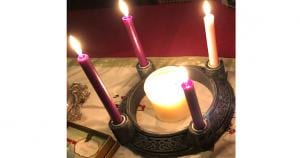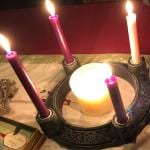Thy Nativity, O Christ our God, hath shined the light of knowledge upon the world; for thereby they that worshipped the stars were instructed by a star to worship Thee, the Sun of Righteousness, and to know Thee, the Dayspring from on high. O Lord, glory be to Thee.
Aa a boy, I read a book The Stars are Ours.
 What did I learn?
What did I learn?
The book suggested that scientists knew things and that anyone who opposed the things scientists knew was bad. This seemed sensible and I adopted the idea.
Sadly for my scientism, my mother also was interested in ideas and asked me about the story. This led to a long Saturday discussion. Mom was NOT opposed (per se) to the ideas of the book so much as seeking to understand them with the temerity to challenge them. They did not fair well in such a Socratic examination.*
The stars are not, even if atheism was true (and Mom was willing to consider anything), ours.
Stop.
Reread.
Why would that star be ours? Who gave it to us? What about the life there, if there was life already there? What about the possibility of life that could come to be there without our interference? Shouldn’t we leave the stars alone? Haven’t we made a big enough hash of our planet?
Mom and I discussed this until we came to the joint conclusion that ethics matters. One cannot do evil that science may come! To pick an easy example, Nazi “experiments’ were not “problematic” because they were not “set up well.” They were evil and so illicit. Since we had a dear friend who had been experimented on by the State of New York secularists (lobotomy as a young African-American child), we understood that the quest for scientific knowledge could become vile.
Since I loved science, this was a hard word.
The dialectic is a hard master.
This always has helped me to understand the Biblical magi. We cannot be sure what they believed, but probably their beliefs were a mix of the mad and the meaningful. The magi knew, rightly, that the outer signs of the cosmos could point to an inner reality, yet they probably had other false beliefs that were crazy.
They came, bad ideas and all, and worshipped.
This is encouraging. Is anyone sure that they have only true beliefs?
The magi remind me that getting the big thing right, a messiah is being born in Bethlehem, compensates for getting many other things wrong. Astrology is bunk, but Jesus was the king of the cosmos!
This is also a hard word. Who wishes to hang out with the astrologers?
Instead, we look for those who are right about everything. Not surprisingly, this group turns out to be those who agree with the ideas we believe or our class believes. We will agree with those people.
This is utterly spurious: we are agreeing with ourselves using history as a mirror. Instead, Christianity teaches us that the wisest people are wrong about more than they get right. We learn to judge on getting the biggest issue right. The wisemen were wise by knowing to worship God in the flesh. They got there by a mix of truth and mistakes. God bless the truth. God condemn the lies, but have mercy on these good wisemen.
They knew to say:
Christ is born!
Glorify Him!
———————————————
*No doubt I misunderstood the book. I read it as arguing for science as the only means to knowledge and science as needing to be unfettered by such things a conservation and ethics.











